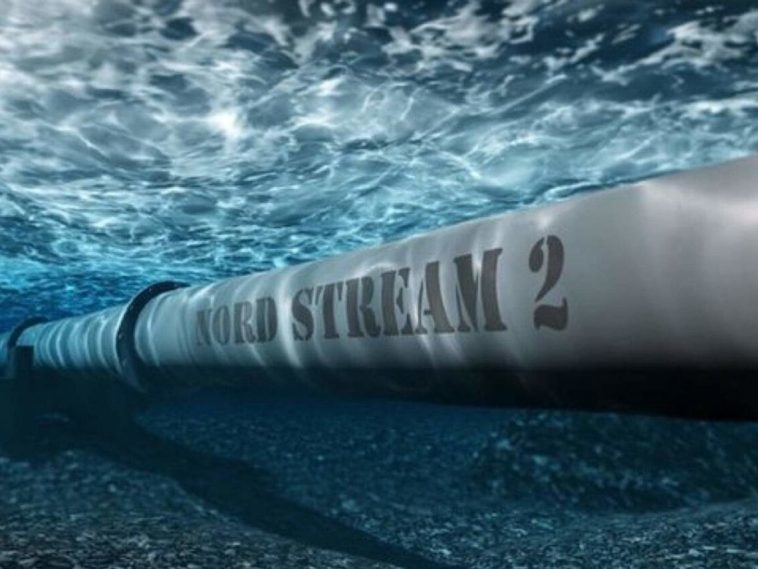In the past weeks, it became clear that the chances of Russia’s Nord Stream 2 gas pipeline going into operation are higher than they were thought to be last year, when the U.S. rolled out the sanctions on Nord Stream 2. While the project clearly serves the economic interests of Russia and Germany, Ukraine has been insisting that the pipeline completion is a security threat to Ukraine and the entire region. It will further untie the hands of Russia on Ukraine, which currently runs the gas transit.
We herewith look at why stopping the construction is important, and what can affect that.
The 1,200-kilometer gas pipeline Nord Stream 2 that runs from Russia to Germany is 95 per cent built. Last year, the U.S. sanctions stopped the construction, but Russia restarted the works on its own as Germany green-lighted them.
To Ukraine, Nord Stream 2 is a strategic matter. Gas transit fees currently bring in three billion U.S. dollars in annual revenue to Ukraine. It’s not just about the money – Ukraine holds on to energy security with gas transmission serving as a shield. It’s unlikely that Russia will attack a country directly linked to its gas market.
“Counterproductive”: no U.S. sanctions against the major construction company of Nord Stream 2. This week, the U.S. President Joe Biden reconfirmed the earlier decision of his administration not to sanction the company in charge of building Nord Stream 2.
“I have been opposed to Nord Stream 2 from the beginning,” Biden said Tuesday as quoted by CNN. “But it was almost completed by the time I took office,” Biden added.
“And to go ahead and impose sanctions now would I think be counterproductive in terms of our European relations and I hope we can work on how they handle it from this point on,” the U.S. President said.
The Biden administration puts as a priority unity with the European allies, and Germany in particular that wants to complete the pipeline. So, tensions flared between the White House and the Congress.
Ukraine’s Foreign Ministry: pipeline traversing Ukraine contains Russia’s aggression. It is clear to Ukraine that, if completed, the Nord Stream 2 project will challenge not only the country’s economy, but also its security as the pipeline running through Ukraine contains the Russian aggression.
“If Nord Stream 2 is completed, it will become not only an economic challenge, but also a 100 per cent security challenge for Ukraine,” Ukraine’s Foreign Minister Dmytro Kuleba said in a recent interview with “Radio NV”. “Not having to preserve and protect the gas infrastructure in Ukraine will encourage Putin to violence even more,” Kuleba proceeded. A factor, underestimated by the EU.
Elections in Germany as a possible game-changer. The autumn election may overturn the position of Germany on the pipeline. The Greens, a possible contender to lead the Germany’s government, oppose Nord Stream 2 for a variety of reasons including environmental ones. On May 25, a co-chair of the Alliance 90/The Greens party Robert Habeck, and Ukraine’s Foreign Minister Dmytro Kuleba “discussed the negative effects of the Nord Stream 2 geopolitical project on Europe’s security and stability” during Habeck’s visit to Ukraine.
“We are most worried about the security challenges brought by Nord Stream 2. We have no doubt that, if the pipeline is completed, Russia will weaponize the project to promote its geopolitical interests, also affecting the efforts in the Normandy format and the Trilateral Contact Group. It threatens not only the security of Ukraine, but of the entire Europe,” Kuleba said.
The Minister underscored that Ukraine’s international allies need to intensify their efforts to prevent the completion of Nord Stream 2.
Habeck expressed solidarity with Ukraine, voicing his party’s position. Alliance 90/The Greens is conscious of the risks that the project carries for Germany and Europe on the whole, the party opposes to its completion, the politician said.
Habeck and Kuleba also discussed the security situation in and around Ukraine. Partial withdrawal of the Russian troops from the Ukraine border slightly decreased the tension, but was not an actual de-escalation, Kuleba said. “Ongoing attacks on the Ukrainian troops’ positions from the temporarily occupied territory in Donetsk and Luhansk regions demonstrate that the threat of Russia’s further incursions stands,” he added.
On May 24, Robert Habeck also met with President Zelenskyi. They discussed the election campaign in Germany.
Completed pipeline to diminish the EU’s leverage over Russia. In their recent analysis piece for the European Council on Foreign relations, policy fellows Jonathan Hackenbroich and Kadri Liik note that Berlin’s intent to complete Nord Stream 2 would diminish Germany’s and Europe’s leverage over Russia.
“So long as the Kremlin believes that, eventually, economic interests will trump normative views and play a decisive role in the relationship, it will lack incentives to modify its stance on Donbas, despite all the effort Germany and France may have invested in the negotiations in the Normandy format. If Moscow stopped expecting economics to sort things out for it, its calculus might change,” researchers say.

